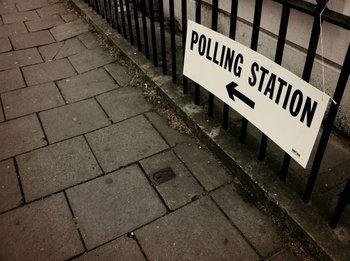Ahead of the United Kingdom's general election, the three major parties have now pledged to maintain at least 0.7% of gross national income on overseas aid. But in a world where anti-aid sentiment is growing every day, it wouldn’t be wise for the aid community to start counting its chickens yet.
As recent as April this year, the Government was rumoured to be divided on whether or not to retain the spending commitment. Some would argue that this reflects public opinion; a poll from late last year found that 57% of participants wanted to scrap the 0.7% target, whilst only 24% backed it. Similarly, the 2017 Aurora Humanitarian Index has shown an overall decline in support for humanitarian action globally.

Credit: Flickr/John Keane
Of course, this is all set against a background of increasingly voracious tabloid scandals reporting ‘waste’ in the aid budget, spent on ‘needless luxuries’ or being ‘doled out in envelopes’. All of this has serious implications for the post-election landscape, where, as we all know, manifesto promises are sometimes kept, and sometimes, well, not.
It doesn’t just matter for UK aid either. In a world where overseas aid is under attack from all corners, what happens here has implications for the wider aid community. The question is, what does this mean for evaluation?
Quite a lot, actually. In my view, it has at least three consequences.
Demonstrating effectiveness
First, there will be an increasing need for evaluations to clearly demonstrate both the effectiveness and cost-effectiveness of aid programmes.
Since 2010, DFID has built up a culture of value for money assessments broadly spanning its portfolio. A range of tools and guidelines are now available to allow programme staff, evaluators and others, to make evidence-based judgments of cost-effectiveness throughout the programme cycle. And there are signs that other agencies are taking on similar approaches, with both SIDA and ECHO developing cost-effectiveness approaches. But the need for clear and well justified demonstrations of cost-effectiveness will become ever greater once the next parliament assembles after the election. This will in turn require ever more evaluators to become proficient in making assessments against DFID’s 3E’s framework (economy, efficiency and effectiveness).
Fighting fake news and alternative truths
Second, findings from evaluations will need to be better communicated, to counter “alternative truths”.
The UK already has a rich ecosystem of evaluation and audit functions for overseas aid, with DFID’s own evaluations supplemented by the Independent Commission for Aid Impact, the National Audit Office, and a world-leading network of research outfits looking at evaluation method and practice. Yet the message that the public sees often comes from other sources, often those more amenable to a good tabloid scandal.
What should be done about this? If the aid industry increases its use of evidence as a tool for the rebuttal of “alternative truths”, where should evaluation sit in this? Should evaluation findings be communicated through new media and new formats? What would this mean for evaluation design? At what point does this road lead into dangerous territory for the independence and integrity of evaluation? These are questions that need asking and answering, now more than ever.
Don't lose sight of accountability to affected people
Third, there is a risk that promoting taxpayer accountability will distract attention from accountability to affected populations.
This is especially important in the humanitarian sector, which has seen repeated drives to increase accountability to affected populations, with only limited results so far. There is a danger that increasing demand for taxpayer accountability will come at the price of distracting the UK aid industry from asking if it works for the very people it seeks to serve: those affected by crisis. Evaluation must play its part in preventing this from happening.
ALNAP provides a space to discuss how to improve evaluation of humanitarian action. You can find out more by exploring the evaluation pages on this site, or by requesting to join our community of practice.